Where Nina Planck and I agree to disagree about vegans
June 17, 2007
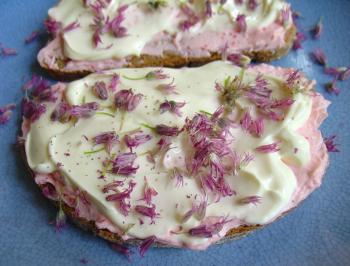
Image barely related to entry: Tarama and full-fat kwark on wholewheat bread strewn with chive flowers
The following is the correspondence between Nina Planck and I on whether or not veganism is natural for humans. I wrote Nina in regard to her newsletter and her New York Times Op Ed statement about veganism. Nina’s letter is used here entirely with her permission.
In the end we don’t agree, but I think it’s an interesting correspondence. I have left out all of the ‘I love yous’ and I love you toos and cut right to the chase.
Me: Nina, your statement that, ‘A vegan diet is not natural to our species’… caused me to begin a little investigation with my Indian colleagues into Jains and veganism. Initially I hadn’t responded to you, sensing that you were inundated, but between colleagues my indirect response that Jains were a shining example of species-natural veganism lasting for millenia, received a wee hurrah.
But I’ve discovered that I wasn’t completely correct. The statement needs to be qualified.
Jain dietary law, although strictly vegetarian and based upon the principle of ahimsa, (non-violence) doesn’t require abstention from dairy products. Milk is allowed because it is, at least notionally, given ‘willingly’. True, there are Jains that hold that all milk isn’t given willingly and thus abstain from dairy, this appears to be a matter of choice and not of the dietary law.
In fact, contemporary Jain food relies rather heavily on dairy. Grahasth, or ‘family people’ are permitted to eat dairy products. Male Jain monks may refrain from them, but female monks are permitted to partake. So although there is certainly a millenia old vegan practice in Jain culture including by pregnant/nursing mothers and growing children, Jain dietary laws do not require a vegan diet of those doing the procreating.
With regard to your assertion that veganism is ‘not natural to our species’, the flexible use and disuse of dairy products by Jains could (alas for my initial argument) point to the notion that animal produced protein is at least on some level considered to be universally desirable.
I also started investigating the diets of various Christian ’sects’ like the 7th Day Adventists (and I say the word sect with all the Christian charity that a non-practicing Jew can muster). But again, these cultures do not require abstention from dairy nor have they existed as a single demographic entity for millenia.
BUT
Where I can continue to disagree with your statement is that vegetarianism and veganism have been practiced for thousands of years. There have always been vegans and vegan children that are raised in a healthy fashion and on a healthy vegan diet, which although different from a 12+ generation vegan lineage, is still interesting with regard to your ‘not natural’ comment.
AND
There is a millenia old connection between animal stewardship in the form of vegetarianism and sprituality.
A vegan diet is not natural to our species?
It is however somehow natural for our species to create dietary laws concerning what we eat, what we refrain from eating, when, and for how long. Fasting and vegetarian/vegan fasting in particular exist as a phenomenon in nearly all cultures.
to which Nina replied:
There are, of course (Indians among them) vegan groups and periods when diets are restricted, eg Catholics eat fish on Fridays within societies. Not the same thing at all. Emphasis by me, because I disagree with this point.
Oddly enough I’ve just been corresponding only in the last couple of days with some Indian cuisine experts, including professional vegans (ie who run the vegan societies) who tell me that Indian vegetarian cuisines always contained milk (but not eggs, which have been added recently). A vegan diet there is gaining ground but it is not historic. Emphasis by me, because I disagree.
Dairy itself is a particularly interesting food, nutritionally and culturally: it varies widely, of course, mostly with climate and geography (goats do well in dry Provençe but not cows; Inuit have no grass for cows at all) which has resulted in variable lactase production. I tend to look to the environment first, and second to culture, which often (but not always!) stems from it.
… I still disagree with Nina’s statement that veganism is not natural based upon the point that veganism is an ever-present cultural phenomenon. In this sense what is natural for humans is to continually remove animal products from their diets for spiritual, cultural and environmental reasons. Sometimes for short periods, indeed as Nina says, never for generation upon generation. But veganism is a persistant cultural phenomenon throughout history. It’s natural, and that’s different from being healthy or sustainable.
BTW: I am not a vegan.
- Nina’s article in the NYTimes
- Jain vegetarianism
- List of famous vegetarians - reads like the Adam Sandler song about who’s Jewish…
- List of vegan bands
- Criteria for vegan food
- Fasting in Jainism
- Jains according to the 2001 census - less Jains than Jews in the world
- The Principle - Ahimsa (Non-violence) is the underlying philosophy of Jainism. The Goal - Jainism is the complete purification of the soul to ascend to the Moksha, a world beyond heaven and earth, where all the liberated souls dwell eternally in a state of energy, consciousness, and bliss.
- Jain symbols
- Jain sacred texts translated into english
- Jain calendar
- Jain nonviolence on YouTube
- 7th Day Adventist Church
- Vegetarianism and religion, dharmic religions leading the pack
- GOOD LINK ABOUT damage to the environment due to livestock
The United Nations released a ground breaking report in November 2006 linking animal agriculture to environmental damage. The report, titled “Livestock?s Long Shadow?Environmental Issues and Options,”[92] concludes that the livestock sector (primarily cows, chickens, and pigs) emerges as one of the top two or three most significant contributors to our most serious environmental problems, at every scale from local to global. It is one of the largest sources of greenhouse gases - responsible for 18% of the world?s greenhouse gas emissions as measured in CO2 equivalents. By comparison, all transportation emits 13.5% of the CO2. It produces 65% of human-related nitrous oxide (which has 296 times the global warming potential of CO2) and 37% of all human-induced methane (which is 23 times as warming as CO2).
debra at 9:35 | | post to del.icio.us
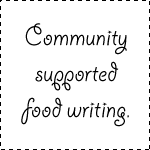



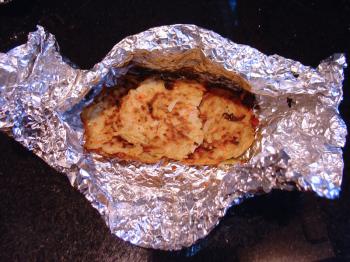
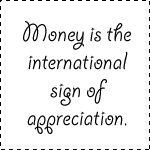






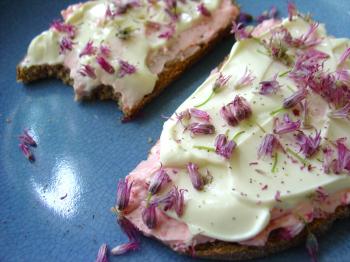



I’m baffled by the use of ‘natural’. What is Nina’s definition of natural? What’s your’s? I don’t think veganism is natural, at least in the same way I don’t think our civilization’s highly centralized and concentrated manner of disposing of human waste is natural, nor is long distance air and land transportation of, say, organic Chilean apples or organic California grapes to NYC natural. This is not to say I think veganism is bad, I think it might be a good alternative diet for many of us. It’s not something I’ve ever approached but I might give some thought.
I think it weakens one’s argument when you try to label it with such an extraordinarily hard to define word like ‘natural’. Perhaps ‘healthy’ is simpler and more to the point. I laugh when I hear anyone tell me what is ‘natural’ as a human being anymore.
Comment by Miguel Marcos — June 17, 2007 @ 16:34
My use of the term natural has to do with regularly occuring phenomenon. It does not mean ‘pristine’ or ‘healthy’ or ‘pure’, it means, ‘as it occurs’.
Have you read any books by scientist/author Janine Benyus? She describes natural phenomena in an interesting way… maybe look her up, I’m temporarily w/o url.
Comment by debra — June 21, 2007 @ 10:27
Thanks for posting this, it’s interesting to see vegans and non-vegans alike following the Planck debate.
I see why it would be worthwhile to study a historically vegan society but I’d like to hope that humans are evolving and if a healthy vegan diet is only possible via recently available vitamin supplements etc (which I’m not convinced is true, btw) then maybe that’s just one more step in the right direction. next stop, world peace. :)
Comment by Vanessa — June 24, 2007 @ 1:46
Jains are awesome. They built this bird hospital in Delhi that’s just about the most heartwarming thing ever.
Comment by Joanna Swan — March 2, 2011 @ 11:31